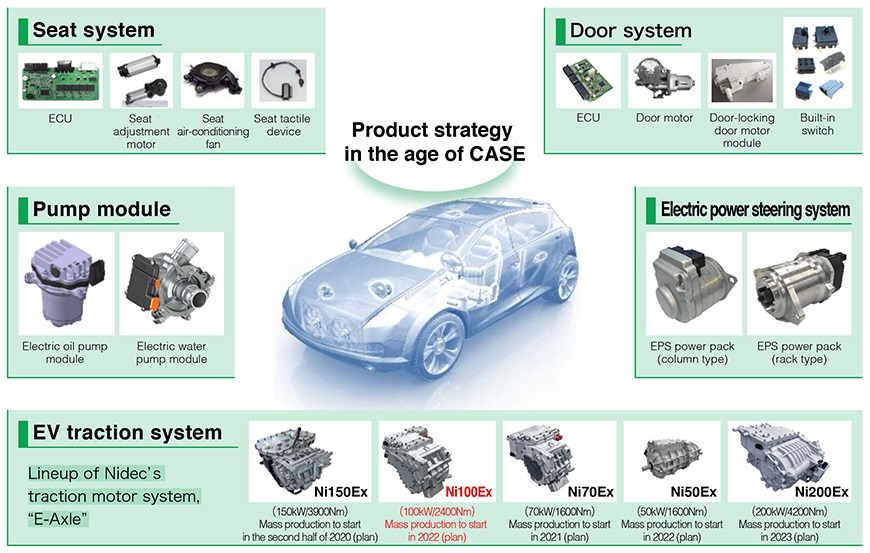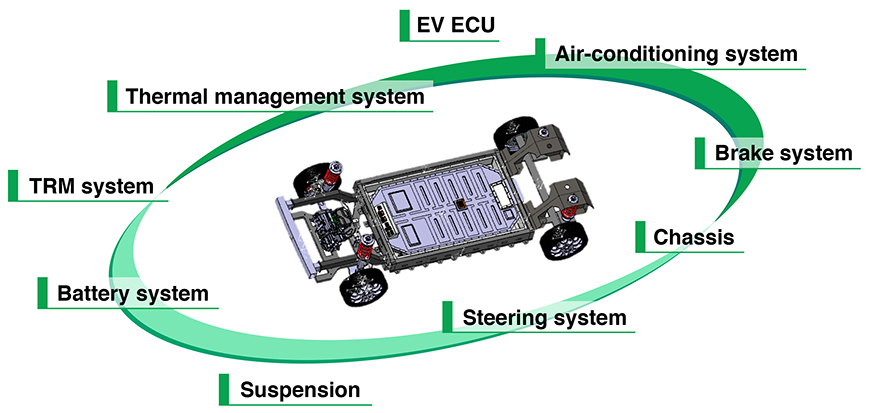Future Technologies
EV platform
Nidec embarks on the development of a versatile wheeled platform – the crucial element to dissemination of EVs.
At present, the auto industry is experiencing a so-called once-in-a-century wave of technological innovation, which includes the electrification of cars and the introduction of automatic driving systems. In particular, motor-powered electric vehicles (EVs), which not only curb environmental load but also halve the number of components from those for conventional, engine-powered cars, will see their cost decrease, and become available for many people at a more reasonable price. A consulting firm’s survey* estimates that approximately 30% of all new vehicles sold in the world will be EVs in 2025, and that the percentage will increase to 51%, or more than half, in 2030. Regarding year 2025 as the “turning point of EVs,” Nidec is focused on developing and manufacturing products that contribute to electrification of vehicles.

In addition to motors to generate a driving force in place of engines, Nidec designs, develops, manufactures, and sells a wide range of products, such as electric power steering systems, sensing camera modules, and millimeter wave radar units, that run, steer, and stop automobiles. Now, moving into the next phase, Nidec has embarked on the development of a car platform (chassis) to mount these components.

A platform is a basic frame of a vehicle, without a power unit (an engine or a motor), a chassis, or a body. Thus, only car manufacturers have developed and produced platforms so far. Any platform is required to be safe and reliable, and serves as an important element that affects the car manufacturer’s strategy. This is why making a platform involves the use of high-level knowhow, and it is not easy to enter into the business. However, in the age of EVs, many emerging manufacturers are expected to start developing vehicles. If those new manufacturers can purchase EV platforms, they will be able to sell finished automobiles without developing an expensive platform themselves. Additionally, in the age of EVs, their manufacturers will likely be able to assemble components supplied by individual device manufacturers and sell finished cars as their products – just like the way PCs are made and sold. In that scenario, existing auto manufacturers will undoubtedly try to differentiate their products based on the software used in them, rather than in hardware development. Therefore, it is no surprise to see car makers that purchase platforms to differentiate their products based on software.
Of course, producing platforms requires taking all possible measures to secure safety and reliability. In manufacturing a number of automotive components, Nidec has accumulated its skills needed for automobiles. We even have internally produced inspection equipment – something essential to enhancing our products’ quality. Being a company whose career started with the development of motors for IT equipment and home appliances, Nidec can flexibly adapt to an increasingly fast-changing market.
Going forward, the needs for cares will continue to grow especially in developing countries. EV platforms will be essential to keep automobiles within low enough, and ensure that anyone in the world can wide an EV. Once produced successfully, EV platforms will be able to increase cars’ production volume several times of the current volume. Nidec will lead the age of EVs as a disruptor that works beyond the existing framework of the auto industry.
- ※Who Will Drive Electric Cars to the Tipping Point?
© Boston Consulting Group 2020
https://image-src.bcg.com/Images/BCG-Who-Will-Drive-Electric-Cars-to-the-Tipping-Point-Jan-2020-rev_tcm56-237575.pdf

